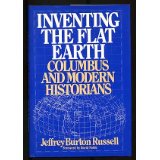What do I think of Jeffrey Russell’s book? Let’s talk about it on Deeper Waters.
Recently, I had a conversation at a store with a salesman who was telling me that people in the past believed the Earth was flat, which I raised disagreement with. Online, one can hear this as a common objection. Often it is treated as an axiom and with the idea that the church was teaching otherwise. Consider this quote from Ingersoll in his essay Individuality
It is a blessed thing that in every age some one has had individuality enough and courage enough to stand by his own convictions,—some one who had the grandeur to say his say. I believe it was Magellan who said, “The church says the earth is flat; but I have seen its shadow on the moon, and I have more confidence even in a shadow than in the church.” On the prow of his ship were disobedience, defiance, scorn, and success.
A flat-earther is used to refer to someone today who is a fool and is going against the progress of science. It’s certainly easy to write off people as believing this. I know in Elementary school and beyond I was taught that Columbus sailed around to demonstrate that the Earth was round and not flat. (Which even if that had been the case, considering he didn’t circumnavigate the globe, he did not prove that anyway.
If only I had know about Russell’s book back then.
Russell’s book is incredibly short. You can easily read it in a couple of hours like I did. In doing so, you will have invested those hours well. Russell points out that after the time of Christ, there were only two people who really brought out the idea that the Earth was flat. How many followers did they get on that count? None. They were certainly the minority. Alas, these two are thought to be representative of the time as a whole, ignoring all the other evidence that indicates people knew it was round.
Now of course, it could be that this did not extend to the masses, but frankly, we have no real way of knowing that. I would wager that for most people who were working hard to put food on the table and care for their families, they did not really think about the shape of the Earth. In fact, if they had, well you just go and ask the local priest and the local priest will tell you what the fathers of the church have said and you’ll hear that it’s round.
Russell also shows how this fed into a false idea of a warfare between science and religion, started mainly by people like John Draper and Andrew Dickson White. In many cases, this because a round of a group of people quoting each other as their own authorities and thereby seeking to establish their case as if it was heavily documented. (Read new atheist literature today and not much has changed.)
While Russell’s thesis is certainly correct and he goes into great detail to show a meeting Columbus had with officials never brought up the shape of the Earth and while his work is filled with scholarly notes, I would like to see future editions contain quotes within the text itself. What would most complete this book is to have a series of quotations from people in this time period on how the Earth was indeed spherical, such as Thomas Aquinas’s in his Summa Theologica in the very first question.
Still, this is a valuable book to read on the controversy. I wish I’d had it in the past instead of just buying into what my teachers taught me.
In Christ,
Nick Peters

